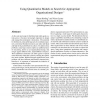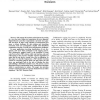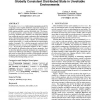618 search results - page 108 / 124 » Coordinating Semantic Peers |
AAMAS
2008
Springer
13 years 11 months ago
2008
Springer
As the scale and scope of distributed and multi-agent systems grow, it becomes increasingly important to design and manage the participants' interactions. The potential for b...
CE
2008
13 years 11 months ago
2008
Exploring student test, homework, and other assessment scores is a challenge for most teachers, especially when attempting to identify cross-assessment weaknesses and produce fina...
ICDM
2009
IEEE
13 years 8 months ago
2009
IEEE
The amount of text data on the Internet is growing at a very fast rate. Online text repositories for news agencies, digital libraries and other organizations currently store gigaan...
POPL
2005
ACM
14 years 11 months ago
2005
ACM
We introduce transactors, a fault-tolerant programming model for composing loosely-coupled distributed components running in an unreliable environment such as the internet into sy...
ATAL
2005
Springer
14 years 4 months ago
2005
Springer
We present dcl-pc: a dynamic logic of delegation and cooperation. The logical foundation of dcl-pc is cl-pc, a logic for reasoning about cooperation in which the powers of agents ...



